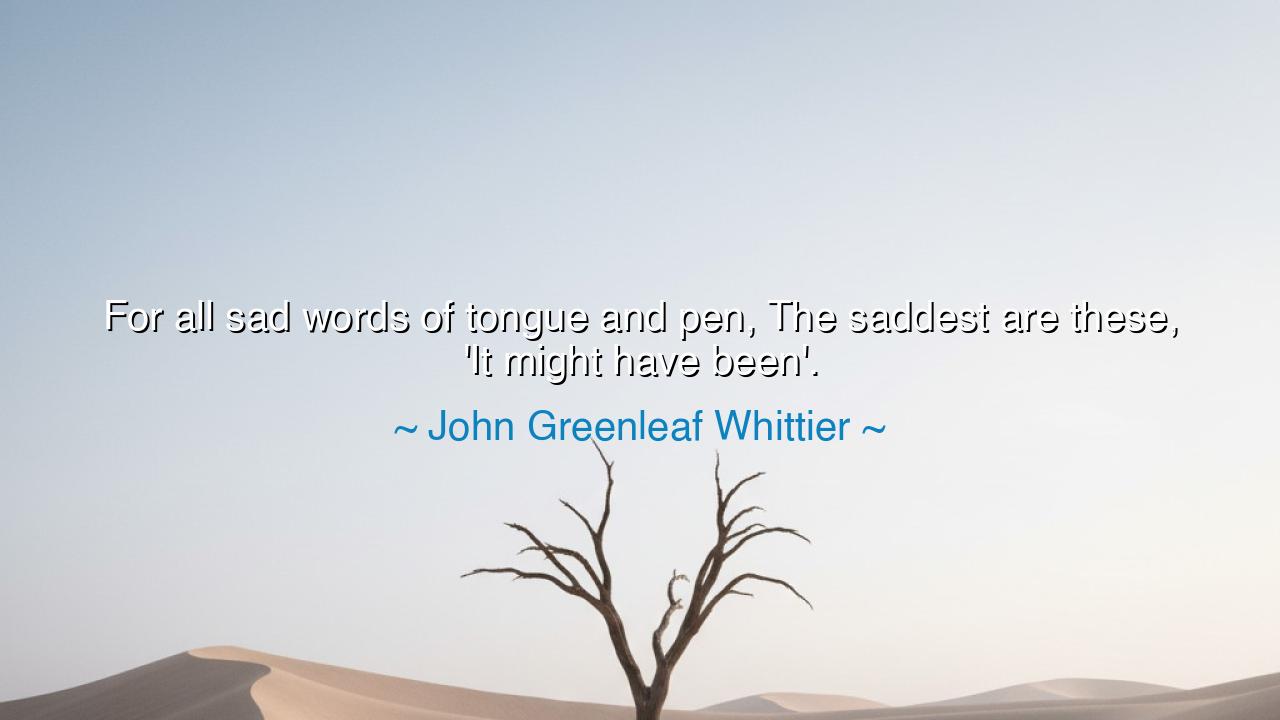
For all sad words of tongue and pen, The saddest are these, 'It






The poet John Greenleaf Whittier once wrote, “For all sad words of tongue and pen, the saddest are these, ‘It might have been.’” These words, carved from the quiet depths of human regret, ring across the ages like the tolling of a distant bell. They speak of a sorrow not born from loss alone, but from what was never dared, never said, never done. In this single line, Whittier gives voice to the most haunting of all griefs — the grief of possibility unfulfilled.
To understand this truth, one must know the poet’s heart. Whittier, a Quaker and a man of conscience, wrote not only of beauty but of moral duty. He lived in a time when the world trembled between change and tradition, and he fought for justice, equality, and peace. Yet even this noble man knew the ache of missed chances, of love unspoken and moments lost to hesitation. His words remind us that time, once passed, never returns, and that the cost of indecision is not measured in days, but in the quiet echo of “if only.”
The ancients would have understood this sorrow well. They taught that fortune favors the bold, that the gods themselves smile upon those who act with courage. To hesitate is to let destiny slip away, for opportunity, like a bird, will not wait forever at one’s window. The philosopher Seneca once said that life is long enough, if only we know how to use it — but to waste it in fear or doubt is to die before our time. Whittier’s words carry the same warning: that it is not failure that wounds the soul most deeply, but the haunting vision of what might have been, had we only tried.
Consider the story of Vincent van Gogh, whose genius went unrecognized in his lifetime. He painted with all the fire of his soul, yet was crushed by poverty and doubt. But imagine, for a moment, if he had never picked up his brush, if fear or despair had silenced him completely. The world would have lost Starry Night, and with it, a fragment of eternity. His life teaches that even in struggle, to act — to create, to love, to strive — is to live truly. The greater tragedy lies not in failure, but in inaction, in leaving our dreams buried within us until they wither away.
Whittier’s lament — “It might have been” — is thus not a cry of defeat, but a warning. It calls to the living: Do not wait for the perfect moment, for perfection is an illusion. Do not let fear steal your voice, nor doubt your courage. The saddest words are spoken not by the dying, but by those who lived half-heartedly — who let chances pass like shadows, who never said “I love you,” who never followed the calling of their heart. For while pain fades, regret endures. It lingers, quiet and constant, whispering in the mind long after all else is gone.
And yet, within these sorrowful words lies also a seed of hope. To know the pain of “it might have been” is to awaken to the truth that life is precious — that every choice, every moment, every risk is sacred. The wise do not dwell in regret, but learn from it. They rise each day resolved not to let another chance escape. The heart that once whispered “if only” can still learn to say “why not?” For as long as breath remains, it is not too late to begin.
Thus, my children of the future, take this teaching to heart: live boldly, love deeply, and act when the call comes. Do not wait for certainty, for certainty never comes. The path will unfold only as you walk it. Speak the words you fear to say, chase the dream that seems beyond reach, forgive before time takes the chance away. When your life nears its twilight, let your heart be light — not heavy with what was left undone, but full with the memory of all you dared to do.
For as John Greenleaf Whittier reminds us, the saddest words are not of failure or defeat, but of inaction and hesitation. Let not your life be haunted by the echo of “it might have been.” Instead, let it sing — a song of courage, of passion, of love fulfilled and purpose embraced. Then, when the final dusk falls, your soul will not whisper in regret, but shine with the peace of one who truly lived.






AAdministratorAdministrator
Welcome, honored guests. Please leave a comment, we will respond soon